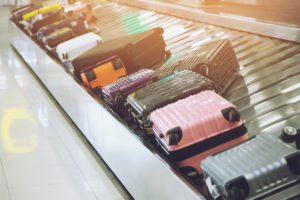Does it seem at all strange to you that the TSA allows passengers to bring watermelons through security yet bottles of water are still a no-no? The rules are don’t always make sense.
As more travelers choose to go carry-on only in an attempt to dodge checked baggage fees, passengers have become familiar with what can and cannot pass through TSA security checks. But don’t assume that whatever isn’t allowed in a carry-on can simply be dumped in a checked bag and pass inspection.
Not only are there just as many TSA restrictions to keep in mind when packing a bag to check, but there are worst-case scenarios to consider as well. For example, what if your bag is lost or its contents severely damaged? Though it may be common sense to many, you should never pack anything of real value in your checked baggage. If you can’t afford to lose it or at least be parted from it indefinitely, stash it in your carry-on or leave it at home.
Medications
As every traveler knows, things don’t always go as planned, and there’s no guarantee that your luggage will arrive on schedule. In rare cases, it may never arrive. In the event that there’s no more overhead space, even carry-on bags can sometimes be gate checked at the last minute. Prepare for the worst and pack all essential medications in your personal item so that you’ll have access to it no matter what.
Laptops, Tablets, E-Readers, and Other Electronics
Sure, it may lighten the load of your carry-on, but it’s liable to turn up in broken in a million pieces, if at all. In transit, bags are routinely thrown as handlers hurry to move them along. A fragile tag doesn’t guarantee anything. Not only could your delicate electronics being damaged en route, but there’s also the risk of theft. In that situation, don’t expect a penny from the airline, as most make it very clear in the contract of carriage that they are not responsible for stolen or damaged electronics. Pack it in your carry on or personal item, or, if you absolutely must, purchase excess valuation coverage.
Related: Global Entry vs TSA PreCheck: Which is Better?
Jewelry, Cash, and Other Valuables
As mentioned above, the airline contract of carriage very clearly states that it is not liable for jewelry and other valuables. If for whatever reason you find yourself ferrying the Heart of the Ocean or a suitcase of cash on your next flight, pack it in your personal item. If you are a person prone to carrying bags of cash and jewels, you might consider spending some to ensure you get overhead space and aren’t in the very last boarding group. Again, with overhead space so limited, carry on bags can sometimes be gate checked.
All Clothing
Odds are you’ll see your bag on the carousel once you land, but airlines do lose bags. You’d be wise to stash an extra outfit in your carry on bag, just in case. If room is an issue, at least toss in an extra pair of underwear and whatever toiletries you need to keep feeling fresh.
Remember that some credit cards provide coverage for lost baggage and that includes reimbursements for incidentals like toiletries and even clothes, within reason.
Related: The 7 Best Luggage Sets for Men
Passports and Essential Documents
These days, boarding passes can be stored on our smartphones and mobile passports apps are quickly becoming a thing, though not as widespread. While we wait for the future, it’s common sense to keep these items on your person to show when asked. Some travelers keep photocopies of their passports tucked away in the event something happens to the original. Before leaving home, consider emailing yourself a copy, or storing it in Google Docs.
Be mindful of keeping any documents in your checked bag—originals or copies—that contain personal data such as social security numbers or banking information.
Matches, Lighters, E-Cigarettes, and Vaping Pens
According to the TSA’s handy What Can I Bring? list, passengers may bring a single book of safety matches in a carry-on bag, but not in checked baggage. Strike-anywhere matches are prohibited. Disposable and zippo lighters without fuel can be brought in carry-ons and up to two fueled lighters can be packed in checked suitcases if enclosed in DOT approved cases. E-cigs and vape pens must also be taken in your carry-on, and never packed in checked baggage.
Lithium Batteries
If you’ve noticed the recent uptick in cases of lithium batteries exploding mid-flight, then you probably won’t be shocked to learn that these aren’t allowed in checked baggage. You can still bring lithium-ion and lithium-metal batteries so long as it’s in your carry on bag.
If your checked bag happens to feature a built-in charging port, as some bags do these days, the charger must be removed before checking your bag.
Related: Beware of Basic Economy: No More Free Changes
Certain Types of Food and Alcohol
When traveling internationally and even to Hawaii, there are some foods you should avoid bringing. Travelers to Hawaii must declare all plants and animals with some items requiring additional inspection. Pineapples, coconuts, corn, and coffee plants are restricted along with other items that might be disruptive to Hawaiian agriculture. You can find the full list at hdoa.hawaii.gov.
When bringing food back from abroad, certain meats and cheeses may not be allowed. If you’re unsure, check the U.S. Department of Agriculture’s Animal and Plant Health Inspection site for travelers.
Most types of alcohol won’t be a problem in checked baggage though anything over 140 proof, such as grain alcohol and very strong rum, is not allowed in carry on or checked baggage.






